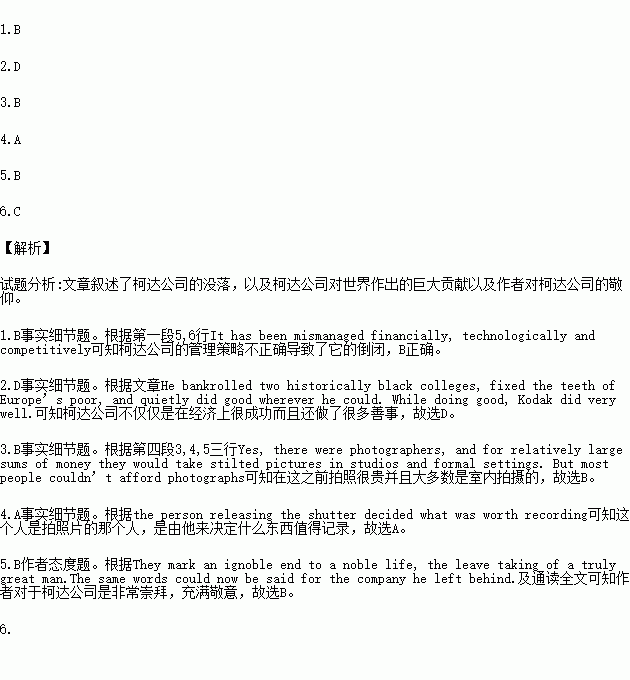题目内容
“My work is done.” Those words were some of the last penned by George Eastman. He included them in his suicide note. They mark an ignoble end to a noble life, the leave taking of a truly great man. The same words could now be said for the company he left behind. Actually, the Eastman Kodak Company is through. It has been mismanaged financially, technologically and competitively. For 20 years, its leaders have foolishly spent down the patrimony of a century’s prosperity. One of America’s bedrock brands is about to disappear, the Kodak moment has passed.
But George Eastman is not how he died, and the Eastman Kodak Company is not how it is being killed. Though the ends be needless and premature, they must not be allowed to overshadow the greatness that came before. Few companies have done so much good for so many people, or defined and lifted so profoundly the spirit of a nation and perhaps the world. It is impossible to understand the 20th Century without recognizing the role of the Eastman Kodak Company.
Kodak served mankind through entertainment, science, national defense and the stockpiling of family memories. Kodak took us to the top of Mount Suribachi and to the Sea of Tranquility. It introduced us to the merry old Land of Oz and to stars from Charlie Chaplin to John Wayne, and Elizabeth Taylor to Tom Hanks. It showed us the shot that killed President Kennedy, and his brother bleeding out on a kitchen floor, and a fallen Martin Luther King Jr. on the hard balcony of a Memphis motel. When that sailor kissed the nurse, and when the spy planes saw missiles in Cuba, Kodak was the eyes of a nation. From the deck of the Missouri to the grandeur of Monument Valley, Kodak took us there. Virtually every significant image of the 20th Century is a gift to posterity(繁荣) from the Eastman Kodak Company.
In an era of easy digital photography, when we can take a picture of anything at any time, we cannot imagine what life was like before George Eastman brought photography to people. Yes, there were photographers, and for relatively large sums of money they would take stilted(不自然的) pictures in studios and formal settings. But most people couldn’t afford photographs, and so all they had to remember distant loved ones, or earlier times of their lives, was memory. Children could not know what their parents had looked like as young people, grandparents far away might never learn what their grandchildren looked like. Eastman Kodak allowed memory to move from the uncertainty of recollection, to the permanence of a photograph. But it wasn’t just people whose features were savable; it was events, the sacred and precious times that families cherish. The Kodak moment, was humanity’s moment.
And it wasn’t just people whose features were savable; it was events, the precious times that families cherish. Kodak let the fleeting moments of birthdays and weddings, picnics and parties, be preserved and saved. It allowed for the creation of the most egalitarian art form. Lovers could take one another’s pictures, children were photographed walking out the door on the first day of school, the person releasing the shutter decided what was worth recording, and hundreds of millions of such decisions were made. And for centuries to come, those long dead will smile and dance and communicate to their unborn progeny(子孙). Family history will be not only names on paper, but smiles on faces.
The cash flow not just provided thousands of people with job, but also allowed the company’s founder to engage in some of the most generous charity in America’s history. Not just in Kodak’s home city of Rochester, New York, but in Tuskegee and London, and at the Massachusetts Institute of Technology. He bankrolled(资助) two historically black colleges, fixed the teeth of Europe’s poor, and quietly did good wherever he could. While doing good, Kodak did very well. Over all the years, all the Kodakers over all the years are essential parts of that monumental legacy. They prospered a great company, but they – with that company – blessed the world.
That is what we should remember about the Eastman Kodak Company. Like its founder, we should remember how it lived, not how it died. History will forget the small men who have scuttled this company. But history will never forget Kodak.
1.According to the passage, which of the following is to blame for the fall of Kodak?
A. The invention of easy digital photography
B. The poor management of the company
C. The early death of George Eastman
D. The quick rise of its business competitors
2.It can be learnt from the passage that George Eastman .
A. died a natural death of old age.
B. happened to be on the spot when President Kennedy was shot dead.
C. set up his company in the capital of the US before setting up its branches all over the world.
D. was not only interested in commercial profits, but also in the improvement of other people’s lives.
3.Before George Eastman brought photography to people, .
A. no photos has ever been taken of people or events
B. photos were very expensive and mostly taken indoors
C. painting was the only way for people to keep a record of their ancestors.
D. grandparents never knew what their grandchildren looked like.
4.The person releasing the shutter (Paragraph 5) was the one .
A. who took the photograph
B. who wanted to have a photo taken
C. whose decisions shaped the Eastman Kodak Company
D. whose smiles could long be seen by their children
5.What is the writer’s attitude towards the Eastman Kodak Company?
A. Disapproving B. Respectful
C. Regretful D.Critical
6.Which do you think is the best title for the passage?
A. Great Contributions of Kodak
B. Unforgettable moments of Kodak
C. Kodak Is Dead
D. History of Eastman Kodak Company

